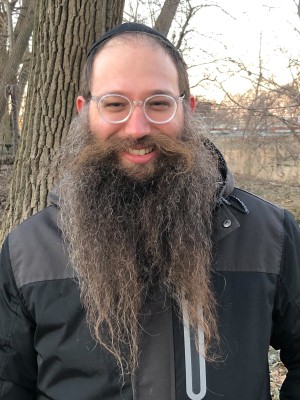
Yehoshua November
Poetry
Yehoshua November is the author of two poetry collections, God’s Optimism (a finalist for the Los Angeles Times Book Prize) and Two Worlds Exist (a finalist for the National Jewish Book Award and the Paterson Poetry Prize). His work has been featured in The New York Times Magazine, Harvard Divinity Bulletin, The Sun, Virginia Quarterly Review, and on National Public Radio and On Being’s Poetry Unbound podcast program.
Teachers and Students
1.
It was when she pulled out her chair
after entering midway
through our fourth class—
muttering what at first sounded like a lie
about struggling to find parking—
that I realized my Vietnamese student
had only one hand.
She wrote a short memoir piece
on her high school music teacher’s prediction
her prosthetic could not summon
the pressure she’d need
to squeeze out the staccato notes
at the upcoming violin recital.
2.
(Strangely, often,
teachers’ most hurtful comments
are also untrue).
3.
At the dining room table, I lost my temper
after one of my sons misread
a word in a Hebrew prayer
we’d practiced a hundred times.
I’m a stupid person. What do you
want from me?
4.
When you pray, do not
make your prayers routine
but an entreaty of mercy and a supplication
before the Almighty,
Rabbi Shimon would say.
5.
All semester, the sorority sister
tossed her dark hair,
checked her phone, whispered to her friends
in light tones.
In her final portfolio, a poem about her attempt,
in ninth grade, to OD on aspirin
after learning the upperclassman
she’d given herself to
had been playing
First Senior to Sleep with a Freshman.
6.
In one of my earliest memories,
I am a boy whose father
has brought him to the town rabbi
for thinking lowly of himself
after earning a B- on an exam
on the book of Genesis.
In his basement office, the large rabbi leans toward me:
Don’t compare yourself to your classmates.
7.
A professor takes a sip of coffee
from his earthenware mug,
writes “Fascinating” in the margins
of a student paper
without reading a word.
8.
In his notebook, on the page
where he wrote about finding
his father’s "ugly blue body,"
my student's script turns very large
but barely legible.
9.
It’s said that at age six—
a slow learner with prodigious stepbrothers
and a famous rabbinic father—
Maimonides ran away from home,
opened the Ark of the local synagogue,
pleaded, saw sparks,
and awoke with a photographic memory.
10.
On my commute to teach courses
in Brooklyn and New Brunswick,
I listen to the recorded lectures of a rabbi
who recently passed away.
Between teaching the technical verses
on the Tabernacle’s construction,
he offers impersonations of the yeshiva cook,
Montreal, circa 1960.
Between Maimonides’s complex formulas
for predicting the appearance of the new moon,
stories of his father’s rabbinate in Newark.
In one, a drunken former S.S. officer
follows the spiritual leader down Union Street,
begging for Divine exoneration.
“I will not forgive you,”
the rabbi answers, each time.
Losing your place, correcting a mistake
you’d made in the previous recording,
you reminded us God
never expected perfection.
11.
Once, I returned a failing paper
to a front tackle,
who stood up to his full 6’7” height,
rustled the pages, and bolted out of the room
in his scarlet sweatsuit.
A moment later he returned
to grab his backpack, flip the light switch,
and disappear again.
Winter’s muted daylight
entered through the windows
along the back wall of the remedial classroom.
In the semi darkness,
seventeen faces gazed up at me.
Listen:
